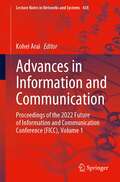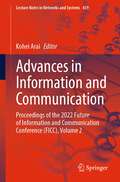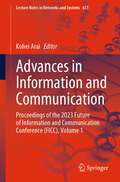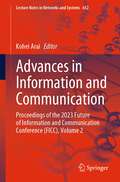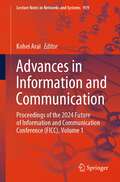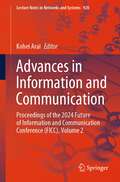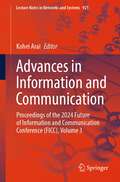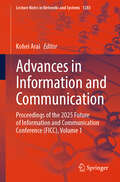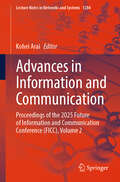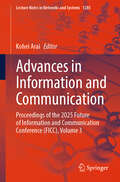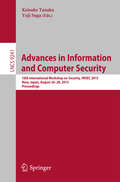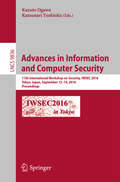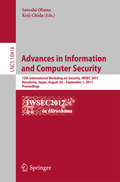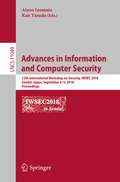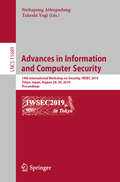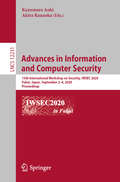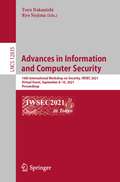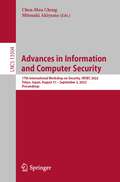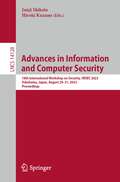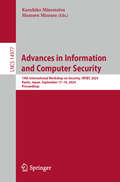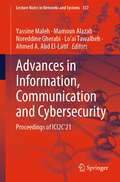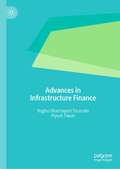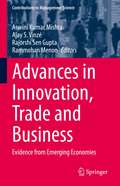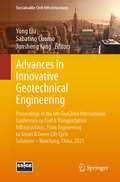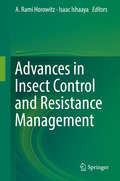- Table View
- List View
Advances in Information and Communication: Proceedings of the 2022 Future of Information and Communication Conference (FICC), Volume 1 (Lecture Notes in Networks and Systems #438)
by Kohei AraiThe book “Advances in Information and Communication Networks - Proceedings of the 2022 Future of Information and Communication Conference (FICC)” aims in presenting the latest research advances, sharing expert knowledge and exchanging ideas with the common goal of shaping the future of Information and Communication. The conference attracted 402 submissions, of which, 131 submissions (including six poster papers) have been selected through a double-blind review process by an international panel of expert referees. This book discusses on aspects of Communication, Data Science, Ambient Intelligence, Networking, Computing, Security and Internet of Things, from classical to intelligent scope. The intention is to help academic pioneering researchers, scientists, industrial engineers, and students become familiar with and stay abreast of the ever-changing technology surrounding their industry. We hope that readers find the volume interesting and valuable; it gathers chapters addressing state-of-the-art intelligent methods and techniques for solving real world problems along with a vision of the future research.
Advances in Information and Communication: Proceedings of the 2022 Future of Information and Communication Conference (FICC), Volume 2 (Lecture Notes in Networks and Systems #439)
by Kohei AraiThe book “Advances in Information and Communication Networks - Proceedings of the 2022 Future of Information and Communication Conference (FICC)” aims in presenting the latest research advances, sharing expert knowledge and exchanging ideas with the common goal of shaping the future of Information and Communication. The conference attracted 402 submissions, of which, 131 submissions (including six poster papers) have been selected through a double-blind review process by an international panel of expert referees. This book discusses on aspects of Communication, Data Science, Ambient Intelligence, Networking, Computing, Security and Internet of Things, from classical to intelligent scope. The intention is to help academic pioneering researchers, scientists, industrial engineers, and students become familiar with and stay abreast of the ever-changing technology surrounding their industry. We hope that readers find the volume interesting and valuable; it gathers chapters addressing state-of-the-art intelligent methods and techniques for solving real world problems along with a vision of the future research.
Advances in Information and Communication: Proceedings of the 2023 Future of Information and Communication Conference (FICC), Volume 1 (Lecture Notes in Networks and Systems #651)
by Kohei AraiThis book gathers the proceedings of the eighth Future of Information and Computing Conference, which was held successfully in virtual mode. It received a total of 369 paper submissions from renowned and budding scholars, academics, and distinguished members of the industry. The topics fanned across various fields involving computing, Internet of Things, data science, and artificial intelligence.Learned scholars from all walks of life assembled under one roof to share their unique, original, and breakthrough researches and paved a new technological path for the world. Many of the studies seek to change the face of the world itself. Their innovative thinking indeed aims to solve several gruesome problems in the field of communication, data science, ambient intelligence, networking, computing, security, and privacy.The authors have strived to render valuable pieces of study in this edition and hope to acquire enthusiastic support from the readers.
Advances in Information and Communication: Proceedings of the 2023 Future of Information and Communication Conference (FICC), Volume 2 (Lecture Notes in Networks and Systems #652)
by Kohei AraiThis book gathers the proceedings of the eighth Future of Information and Computing Conference, which was held successfully in virtual mode. It received a total of 369 paper submissions from renowned and budding scholars, academics, and distinguished members of the industry. The topics fanned across various fields involving computing, Internet of Things, data science, and artificial intelligence.Learned scholars from all walks of life assembled under one roof to share their unique, original, and breakthrough researches and paved a new technological path for the world. Many of the studies seek to change the face of the world itself. Their innovative thinking indeed aims to solve several gruesome problems in the field of communication, data science, ambient intelligence, networking, computing, security, and privacy.The authors have strived to render valuable pieces of study in this edition and hope to acquire enthusiastic support from the readers.
Advances in Information and Communication: Proceedings of the 2024 Future of Information and Communication Conference (FICC), Volume 1 (Lecture Notes in Networks and Systems #919)
by Kohei AraiThe book is a valuable collection of papers presented in the Future of Information and Communications Conference (FICC), conducted by Science and Information Organization on 4–5 April 2024 in Berlin. It received a total of 401 paper submissions out of which 139 are published after careful double-blind peer-review.Renowned and budding scholars, academics, and distinguished members of the industry assembled under one roof to share their breakthrough research providing answers to many complex problems boggling the world. The topics fanned across various fields involving Communication, Data Science, Ambient Intelligence, Networking, Computing, Security, and Privacy.
Advances in Information and Communication: Proceedings of the 2024 Future of Information and Communication Conference (FICC), Volume 2 (Lecture Notes in Networks and Systems #920)
by Kohei AraiThe book is a valuable collection of papers presented in the Future of Information and Communications Conference (FICC), conducted by Science and Information Organization on 4–5 April 2024 in Berlin. It received a total of 401 paper submissions out of which 139 are published after careful double-blind peer-review. Renowned and budding scholars, academics, and distinguished members of the industry assembled under one roof to share their breakthrough research providing answers to many complex problems boggling the world. The topics fanned across various fields involving Communication, Data Science, Ambient Intelligence, Networking, Computing, Security, and Privacy.
Advances in Information and Communication: Proceedings of the 2024 Future of Information and Communication Conference (FICC), Volume 3 (Lecture Notes in Networks and Systems #921)
by Kohei AraiThe book is a valuable collection of papers presented in the Future of Information and Communications Conference (FICC), conducted by Science and Information Organization on 4–5 April 2024 in Berlin. It received a total of 401 paper submissions out of which 139 are published after careful double-blind peer-review. Renowned and budding scholars, academics, and distinguished members of the industry assembled under one roof to share their breakthrough research providing answers to many complex problems boggling the world. The topics fanned across various fields involving Communication, Data Science, Ambient Intelligence, Networking, Computing, Security, and Privacy.
Advances in Information and Communication: Proceedings of the 2025 Future of Information and Communication Conference (FICC), Volume 1 (Lecture Notes in Networks and Systems #1283)
by Kohei AraiThis book comprises the proceedings of the Future of Information and Communication Conference (FICC) 2025, held on 28–29 April 2025 in Berlin, Germany. The conference brought together leading researchers, industry experts, and academics from across the globe to discuss the latest advancements, challenges, and opportunities in the rapidly evolving field of information and communication technologies. The conference received an impressive 401 submissions, of which 138 high-quality papers were selected after a rigorous peer-review process. These contributions span a diverse range of topics, including artificial intelligence, cybersecurity, data science, networking, human-computer interaction, and more. FICC 2025 provided an engaging platform for collaboration and knowledge exchange, highlighting state-of-the-art research and practical solutions to global challenges. This proceedings book serves as a valuable resource for researchers, practitioners, and innovators seeking insights into the future of information and communication technologies.
Advances in Information and Communication: Proceedings of the 2025 Future of Information and Communication Conference (FICC), Volume 2 (Lecture Notes in Networks and Systems #1284)
by Kohei AraiThis book comprises the proceedings of the Future of Information and Communication Conference (FICC) 2025, held on 28-29 April 2025 in Berlin, Germany. The conference brought together leading researchers, industry experts, and academics from across the globe to discuss the latest advancements, challenges, and opportunities in the rapidly evolving field of information and communication technologies. The conference received an impressive 401 submissions, of which 138 high-quality papers were selected after a rigorous peer-review process. These contributions span a diverse range of topics, including artificial intelligence, cybersecurity, data science, networking, human–computer interaction, and more. FICC 2025 provided an engaging platform for collaboration and knowledge exchange, highlighting state-of-the-art research and practical solutions to global challenges. This proceedings book serves as a valuable resource for researchers, practitioners, and innovators seeking insights into the future of information and communication technologies.
Advances in Information and Communication: Proceedings of the 2025 Future of Information and Communication Conference (FICC), Volume 3 (Lecture Notes in Networks and Systems #1285)
by Kohei AraiThis book comprises the proceedings of the Future of Information and Communication Conference (FICC) 2025, held on 28-29 April 2025 in Berlin, Germany. The conference brought together leading researchers, industry experts, and academics from across the globe to discuss the latest advancements, challenges, and opportunities in the rapidly evolving field of information and communication technologies. The conference received an impressive 401 submissions, of which 138 high-quality papers were selected after a rigorous peer-review process. These contributions span a diverse range of topics, including artificial intelligence, cybersecurity, data science, networking, human–computer interaction, and more. FICC 2025 provided an engaging platform for collaboration and knowledge exchange, highlighting state-of-the-art research and practical solutions to global challenges. This proceedings book serves as a valuable resource for researchers, practitioners, and innovators seeking insights into the future of information and communication technologies.
Advances in Information and Computer Security: 10th International Workshop on Security, IWSEC 2015, Nara, Japan, August 26-28, 2015, Proceedings (Lecture Notes in Computer Science #9241)
by Keisuke Tanaka Yuji SugaThis book constitutes the proceedings of the 10th International Workshop on Security, IWSEC 2015, held in Nara, Japan, in August 2015. The 18 full papers and 3 short papers presented in this volume were carefully reviewed and selected from 58 submissions. They were organized in topical sections named: identity-based encryption; elliptic curve cryptography; factoring; symmetric cryptanalysis; provable security; LWE-based encryption; privacy-preserving and anonymity; secure protocol; systems security; and security in hardware.
Advances in Information and Computer Security: 11th International Workshop on Security, IWSEC 2016, Tokyo, Japan, September 12-14, 2016, Proceedings (Lecture Notes in Computer Science #9836)
by Kazuto Ogawa Katsunari YoshiokaThis book constitutes the refereed proceedings of the 11th International Workshop on Security, IWSEC 2016, held in Tokyo, Japan, in September 2016. The 15 regular papers and 4 short papers presented in this volume were carefully reviewed and selected from 53 submissions. They were organized in topical sections named: system security; searchable encryption; cryptanalysis; permutation and symmetric encryption; privacy preserving; hardware security; post-quantum cryptography; and paring computation.
Advances in Information and Computer Security: 12th International Workshop on Security, IWSEC 2017, Hiroshima, Japan, August 30 – September 1, 2017, Proceedings (Lecture Notes in Computer Science #10418)
by Satoshi Obana Koji ChidaThis book constitutes the refereed proceedings of the 12th International Workshop on Security, IWSEC 2017, held in Hiroshima, Japan, in August/September 2017. The 11 regular papers and 3 short papers presented in this volume were carefully reviewed and selected from 37 submissions. They were organized in topical sections named: post-quantum cryptography; system security; public key cryptosystems; cryptanalysis; and cryptographic protocols.
Advances in Information and Computer Security: 13th International Workshop on Security, IWSEC 2018, Sendai, Japan, September 3-5, 2018, Proceedings (Lecture Notes in Computer Science #11049)
by Atsuo Inomata Kan YasudaThis book constitutes the refereed proceedings of the 13th International Workshop on Security, IWSEC 2018, held in Sendai, Japan, in September 2018. The 18 regular papers and 2 short papers presented in this volume were carefully reviewed and selected from 64 submissions. They were organized in topical sections named: Cryptanalysis, Implementation Security, Public-Key Primitives, Security in Practice, Secret Sharing, Symmetric-Key Primitives, and Provable Security.
Advances in Information and Computer Security: 14th International Workshop on Security, IWSEC 2019, Tokyo, Japan, August 28–30, 2019, Proceedings (Lecture Notes in Computer Science #11689)
by Nuttapong Attrapadung Takeshi YagiThis book constitutes the refereed proceedings of the 14th International Workshop on Security, IWSEC 2019, held in Tokyo, Japan, in August 2019. The 18 regular papers and 5 short papers presented in this volume were carefully reviewed and selected from 61 submissions. They were organized in topical sections named: Public-Key Primitives; Cryptanalysis on Public-Key Primitives; Cryptographic Protocols; Symmetric-Key Primitives; Malware Detection and Classification; Intrusion Detection and Prevention; Web and Usable Security; Cryptanalysis on Symmetric-Key Primitives; and Forensics.
Advances in Information and Computer Security: 15th International Workshop on Security, IWSEC 2020, Fukui, Japan, September 2–4, 2020, Proceedings (Lecture Notes in Computer Science #12231)
by Kazumaro Aoki Akira KanaokaThis book constitutes the refereed proceedings of the 15th International Workshop on Security, IWSEC 2020, held in Fukui, Japan, in September 2020.* The 15 regular papers and 1 short paper presented in this volume were carefully reviewed and selected from 47 submissions. They were organized in topical sections named: symmetric-key cryptography, malicious activity detection, multiparty computation, post quantum cryptography, privacy, pairing-based cryptography, and machine learning. * The conference was held virtually due to the COVID-19 pandemic.
Advances in Information and Computer Security: 16th International Workshop on Security, IWSEC 2021, Virtual Event, September 8–10, 2021, Proceedings (Lecture Notes in Computer Science #12835)
by Toru Nakanishi Ryo NojimaThis book constitutes the refereed proceedings of the 16th International Workshop on Security, IWSEC 2021, held in Tokyo, Japan in September 2021. The conference was held virtually due to COVID-19 pandemic. The 14 regular papers and 3 short paper presented in this volume were carefully reviewed and selected from 37 submissions. They were organized in topical sections named: Lattice-Based Cryptography; System Security; Multiparty Computation; Machine Learning and Security; Post-quantum Cryptography; Symmetric-key Cryptography; Game Theory and Security.
Advances in Information and Computer Security: 17th International Workshop on Security, IWSEC 2022, Tokyo, Japan, August 31 – September 2, 2022, Proceedings (Lecture Notes in Computer Science #13504)
by Chen-Mou Cheng Mitsuaki AkiyamaThis book constitutes the refereed proceedings of the 17th International Workshop on Security, IWSEC 2022, which took place as a hybrid event in Tokyo, Japan, in August/September 2022. The 12 full papers presented in this book were carefully reviewed and selected from 34 submissions. They were organized in topical sections as follows: mathematical cryptography; system security and threat intelligence; symmetric-key cryptography; post-quantum cryptography; advanced cryptography.
Advances in Information and Computer Security: 18th International Workshop on Security, IWSEC 2023, Yokohama, Japan, August 29–31, 2023, Proceedings (Lecture Notes in Computer Science #14128)
by Junji Shikata Hiroki KuzunoThis book constitutes the refereed proceedings of the 18th International Workshop on Security, IWSEC 2023, which took place as a hybrid event in Yokohama, Japan, during August 29–31, 2023. This event was held in hybrid mode. The 14 full papers presented in this book were carefully reviewed and selected from 47 submissions. They were organized in topical sections as follows: System and Hardware Security; Symmetric Key Cryptography; Public Key Cryptography; Zero Knowledge Proofs; and Card Based Cryptography.
Advances in Information and Computer Security: 19th International Workshop on Security, IWSEC 2024, Kyoto, Japan, September 17–19, 2024, Proceedings (Lecture Notes in Computer Science #14977)
by Mamoru Mimura Kazuhiko MinematsuThis book constitutes the proceedings of the 19th International Workshop on Security on Advances in Information and Computer Security, IWSEC 2024, held in Kyoto, Japan, in September 17-19, 2024. The 14 full papers and 3 short papers were carefully reviewed and selected from 47 submissions. These papers were categorized into the following sections: authenticated encryption; symmetric-key cryptanalysis; protocols; analysis of public-key cryptosystems; vulnerability; malware countermeasure; network security and privacy.
Advances in Information, Communication and Cybersecurity: Proceedings of ICI2C’21 (Lecture Notes in Networks and Systems #357)
by Yassine Maleh Mamoun Alazab Lo’ai Tawalbeh Noreddine Gherabi Ahmed A. Abd El-LatifThis book gathers the proceedings of the International Conference on Information, Communication and Cybersecurity, held on November 10–11, 2021, in Khouribga, Morocco. The conference was jointly coorganized by The National School of Applied Sciences of Sultan Moulay Slimane University, Morocco, and Charles Darwin University, Australia. This book provides an opportunity to account for state-of-the-art works, future trends impacting information technology, communications, and cybersecurity, focusing on elucidating the challenges, opportunities, and inter-dependencies that are just around the corner. This book is helpful for students and researchers as well as practitioners.ICI2C 2021 was devoted to advances in smart information technologies, communication, and cybersecurity. It was considered a meeting point for researchers and practitioners to implement advanced information technologies into various industries. There were 159 paper submissions from 24 countries. Each submission was reviewed by at least three chairs or PC members. We accepted 54 regular papers (34\%). Unfortunately, due to limitations of conference topics and edited volumes, the Program Committee was forced to reject some interesting papers, which did not satisfy these topics or publisher requirements. We would like to thank all authors and reviewers for their work and valuable contributions. The friendly and welcoming attitude of conference supporters and contributors made this event a success!
Advances in Infrastructure Finance
by Piyush Tiwari Raghu Dharmapuri TirumalaThis book examines advanced approaches to finance infrastructure projects. In doing so, it synthesizes developments and generates new understandings in the field. Infrastructure financing has moved beyond traditional government funding, multilateral assistance, and project finance, to a diverse set of innovative approaches, increasing participation from private, institutional, commercial, and philanthropic investors.Chapters in the book discuss various infrastructure finance themes including the dynamism of project finance, diversification of multilateral assistance into various concessional and guarantee instruments, the surge of green and other thematic bonds, the role of land value capture, funded and unfunded risk mitigation options, growth of private institutional markets, and asset recycling. Given that developments in infrastructure finance are followed by many financial institutions, private developers, public sector policymakers, consulting firms and academic institutions, a researched discussion on the subject will help readers reflect on, compare and contrast the emerging trends in relation to their practice.
Advances in Innovation, Trade and Business: Evidence from Emerging Economies (Contributions to Management Science)
by Aswini Kumar Mishra Ajay S. Vinzé Rajorshi Sen Gupta Rammohan MenonSince the process of liberalization and opening of markets in the 1990s, the emerging markets have created a thriving culture of entrepreneurship, creativity and global collaboration. Along with these opportunities, however, there are challenges in doing business with emerging markets. This book underlines the challenges that come with managing business relationships in diverse emerging countries such as India. It also provides useful implications and conclusions for successful and profitable business ventures in emerging economies.
Advances in Innovative Geotechnical Engineering: Proceedings of the 6th GeoChina International Conference on Civil & Transportation Infrastructures: From Engineering to Smart & Green Life Cycle Solutions -- Nanchang, China, 2021 (Sustainable Civil Infrastructures)
by Yong Liu Junsheng Yang Sabatino CuomoWith the development of social and science, new requirements are put forward for geotechnical engineering. Advanced geotechnical techniques were proposed to solve the new challenges in geotechnical engineering. The articles presented in this volume aim to the new development of geotechnical engineering such as characterization of geomaterials, slope stability, application of environmental protection materials and some other geotechnical issues that are becoming quite relevant in today's world.
Advances in Insect Control and Resistance Management
by Isaac Ishaaya A. Rami HorowitzThe present book covers different approaches regardingadvances in insect control and in resistance management: some chapters presentand summarize general strategies or tactics for managing insect pests, whileothers cover alternative and non-chemical methods for controlling pests;another part is devoted to different aspects of insecticides, insecticideresistance mechanisms and management.
